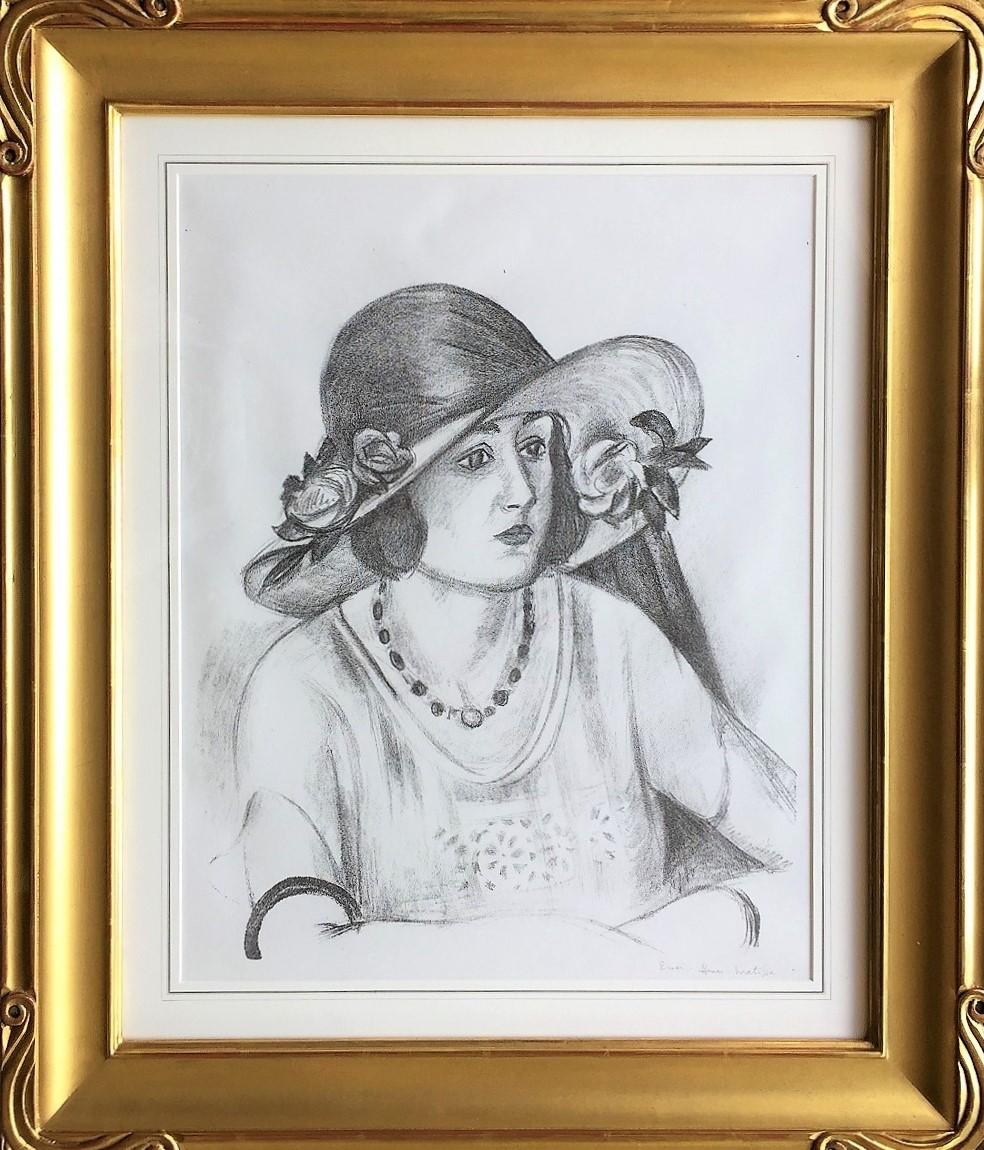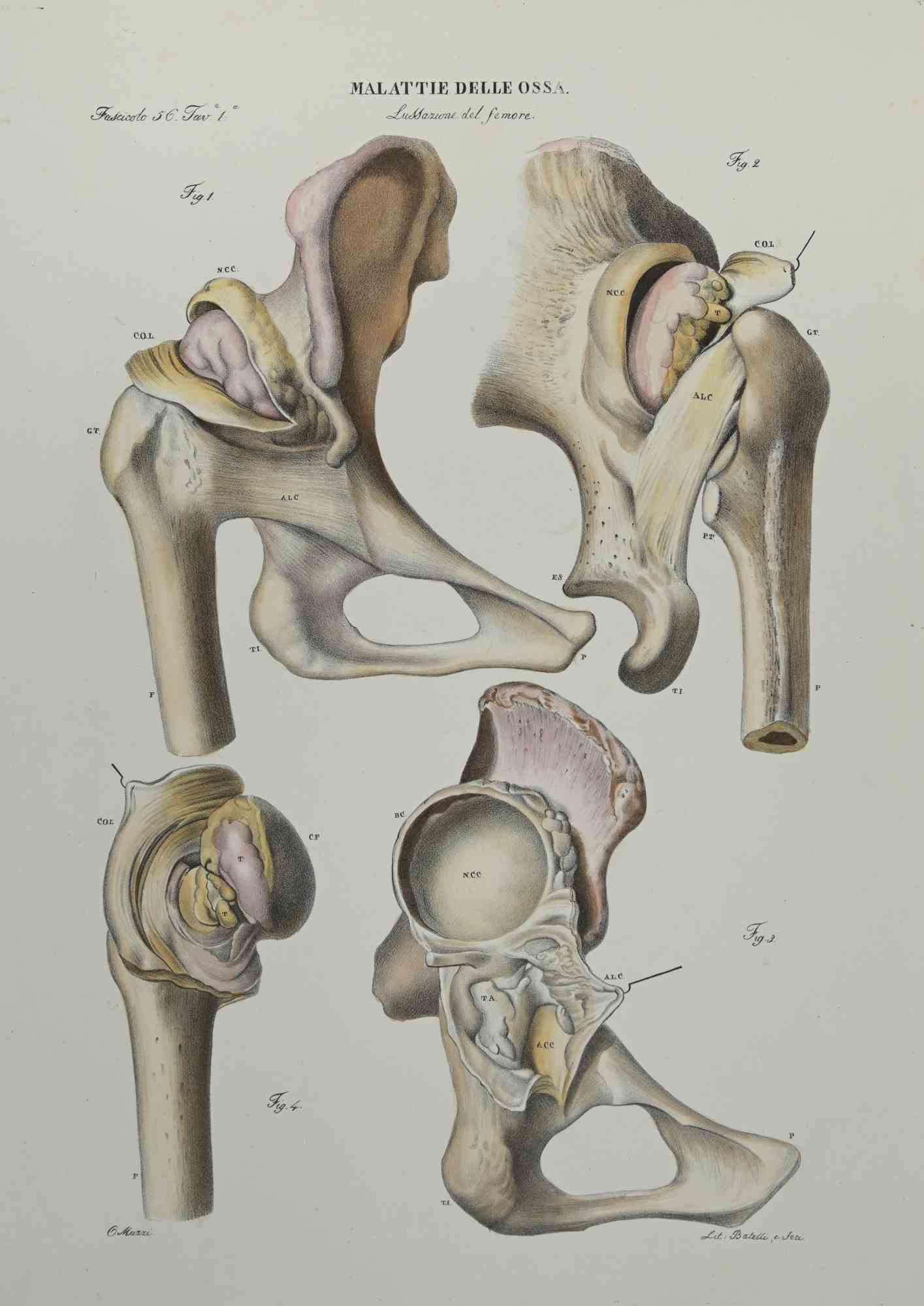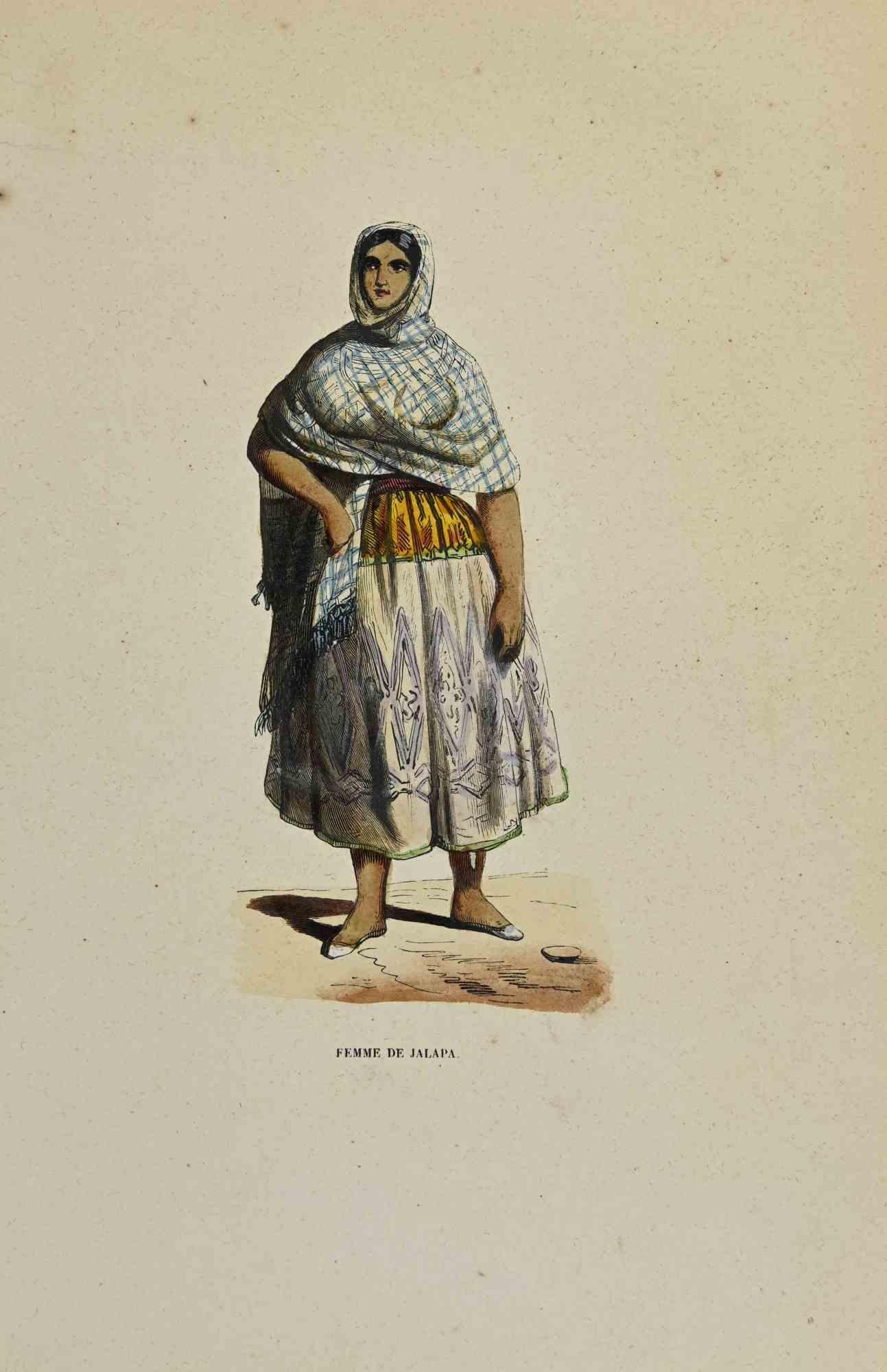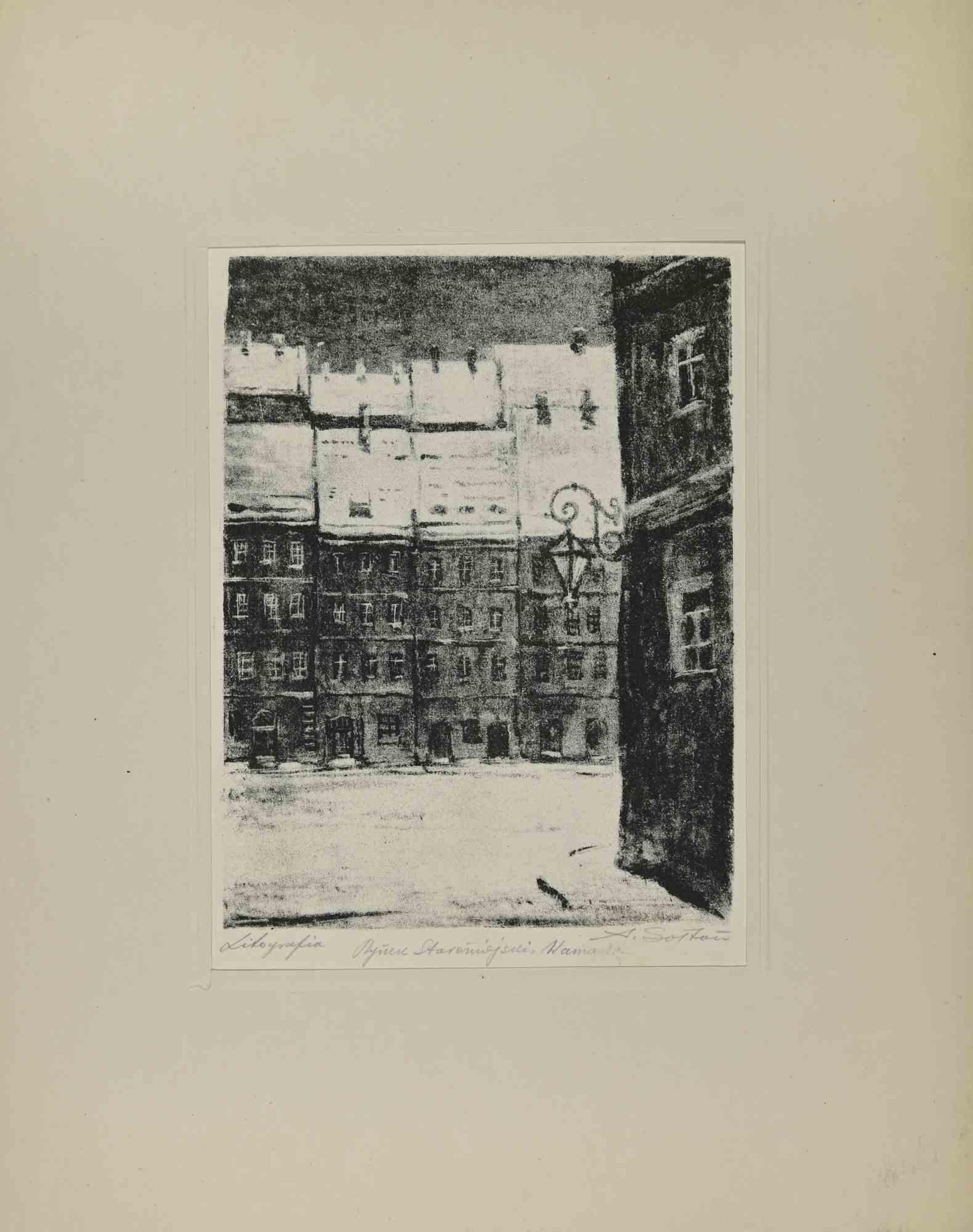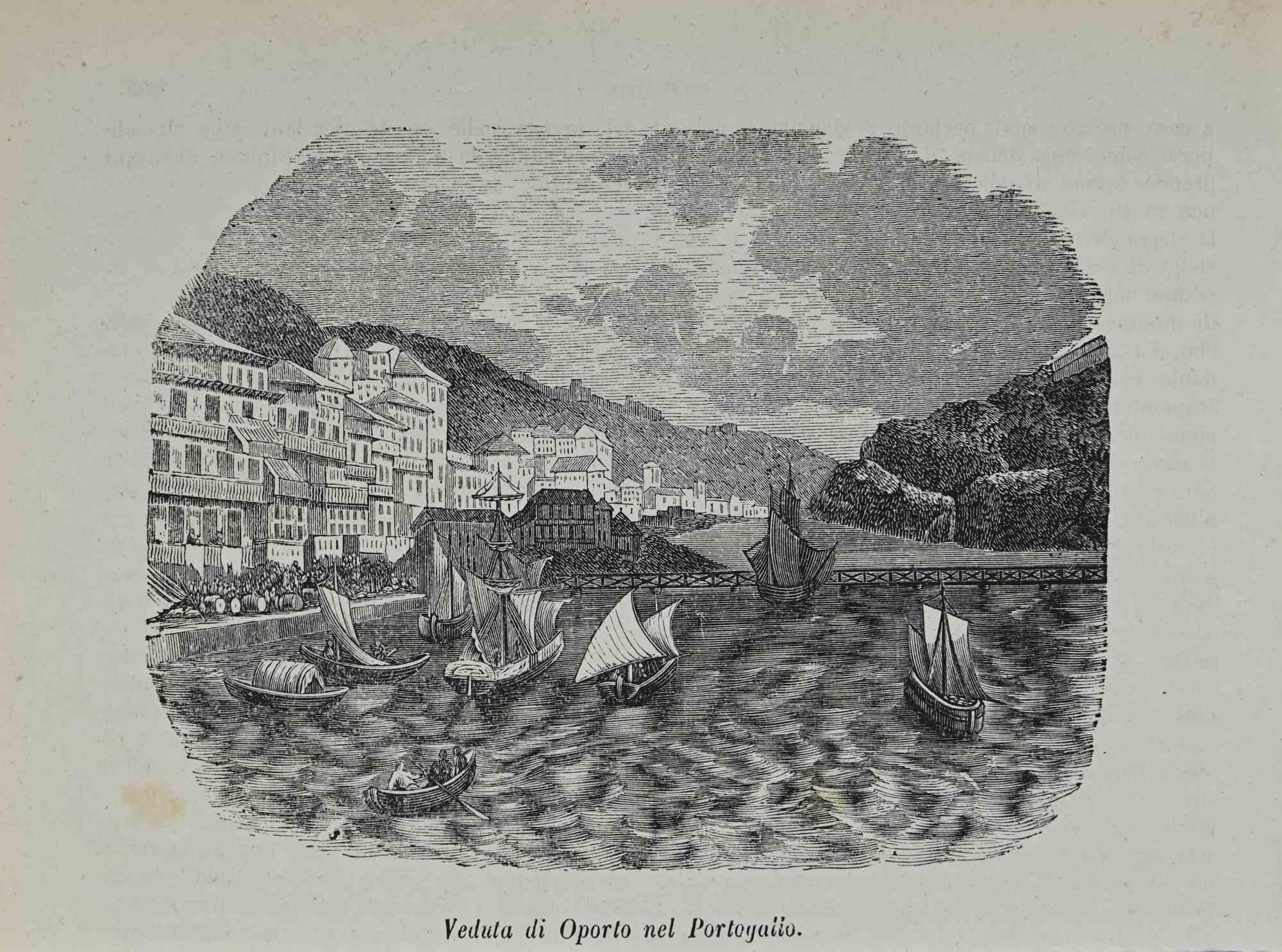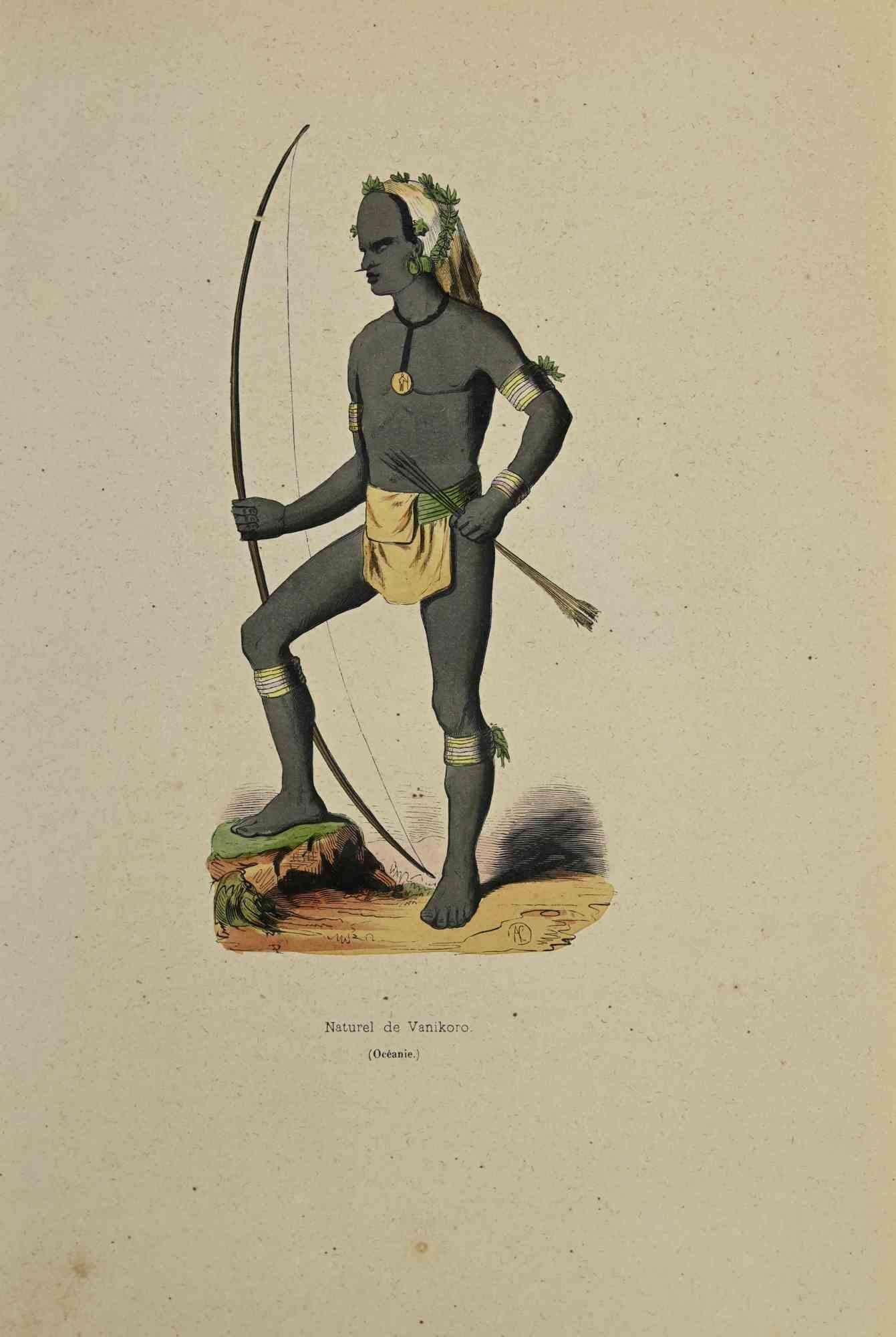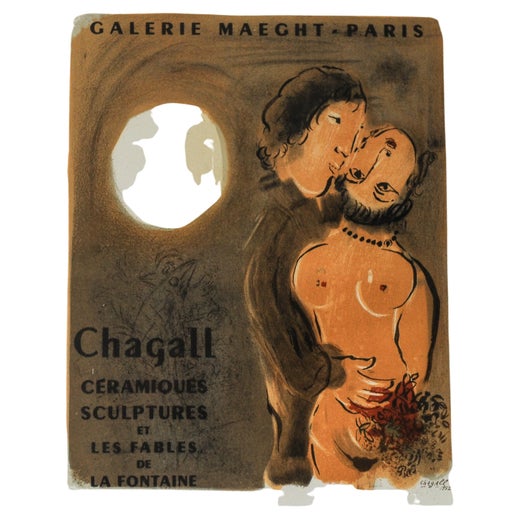Items Similar to "Galerie Maeght, " Offset Lithograph Poster After a Painting by Marc Chagall
Want more images or videos?
Request additional images or videos from the seller
1 of 8
(after) Marc Chagall"Galerie Maeght, " Offset Lithograph Poster After a Painting by Marc Chagall1981
1981
About the Item
"Galerie Maeght" is an offset lithograph poster after a painting by Marc Chagall. It depicts a large man holding a bouquet of flowers over a building. It was published by Galerie Maeght.
36" x 22 5/8" art
Marc Chagall was born in Liozno, near Vitebsk, now in Belarus, the eldest of nine children in a close-knit Jewish family led by his father Khatskl (Zakhar) Shagal, a herring merchant, and his mother, Feige-Ite. This period of his life, described as happy though impoverished, appears in references throughout Chagall's work. The family home on Pokrovskaya Street is now the Marc Chagall Museum.
He began studying painting in 1906 with a local artist, Yehuda Pen. In 1907, he moved to St. Petersburg. There he joined the school of the Society of Art Supporters and studied under Nikolai Roerich. It was here that he was exposed to experimental theater and the work of such artists as Gauguin. From 1908-1910 Chagall studied under Leon Bakst at the Zvantseva School of Drawing and Painting.
This was a difficult period for Chagall; at the time, Jewish residents were only allowed to live in St. Petersburg with a permit, and the artist was jailed for a brief period for an infringement of this restriction. Despite this, Chagall remained in St. Petersburg until 1910, and regularly visited his home town where, in 1909, he met his future wife, Bella Rosenfeld.
After gaining a reputation as an artist, Chagall left St. Petersburg to settle in Paris to be near the burgeoning art community in the Montparnasse district, where he developed friendships with such avant-garde luminaries as Guillaume Apollinaire, Robert Delaunay, and Fernand Léger. In 1914, he returned to Vitebsk and, a year later, married his fiancée, Bella. While in Russia, World War I erupted and, in 1916, the Chagalls had their first child, a daughter named Ida.
Chagall became an active participant in the Russian Revolution of 1917. Although the Soviet Ministry of Culture made him a Commissar of Art for the Vitebsk region, where he founded Vitebsk Museum of Modern Art and an art school, he did not fare well politically under the Soviet system. "Chagall was considered a non-person by the Soviets because he was Jewish and a painter whose work did not celebrate the heroics of the Soviet people."[6] He and his wife moved back to Paris in 1922.
During this period, Chagall wrote articles, poetry and his memoirs (in Yiddish,) which were published mainly in newspapers (and only posthumously in book-form). Chagall became a French citizen in 1937.
With the Nazi occupation of France during World War II and the deportation of Jews, the Chagalls fled Paris, seeking asylum at Villa Air-Bel in Marseille, where the American journalist Varian Fry assisted in their escape from France through Spain and Portugal. In 1941, the Chagalls settled in the United States where he lived until 1948 (his wife Bella died in 1944.)
His wife Bella, who appears in many of his paintings, bore him one child, Ida and then died on September 2, 1944. Bella and Ida appeared in many of his early and most famous paintings. In 1945, he began a relationship with his housekeeper Virginia Haggard McNeil, with whom he had a son, David. In the 1950s, they moved to a villa in Provence. Virginia left him in 1952, and Chagall married Valentina Brodsky (whom he called "Vava").
Jewish influence
Chagall had a complex relationship with Judaism. On the one hand, he credited his Russian Jewish cultural background as being crucial to his artistic imagination. But however ambivalent he was about his religion, he could not avoid drawing upon his Jewish past for artistic material. As an adult, he was not a practicing Jew, but through his paintings and stained glass, he continually tried to suggest a more "universal message," using both Jewish and Christian themes.
Later life
He traveled several times to Greece and visited Israel in 1957. During this time, he rediscovered a free and vibrant use of color. His works of this period are dedicated to love and the joy of life, with curved, sinuous figures. He also began to work in sculpture, ceramics, and stained glass.
In a recent book review of Chagall's biography, author Serena Davies writes, "By the time he died in France in 1985 - the last surviving master of European modernism, outliving Joan Miró by two years - he had experienced at first hand the high hopes and crushing disappointments of the Russian revolution, and had witnessed the end of the Pale, the near annihilation of European Jewry, and the obliteration of Vitebsk, his home town, where only 118 of a population of 240,000 survived the Second World War.
She later adds that the book "leaves us finally with an image of a man who came from nowhere to achieve world-wide acclaim. Yet his fractured relationship with his Jewish identity - he was physically divorced from his homeland, and he wasn't a practising Jew - was unresolved and tragic. He would have died with no Jewish rites, had not a stranger stepped forward and said the kaddish, the Jewish prayer for the dead, over his coffin.
- Creator:(after) Marc Chagall (1887 - 1985, French, Russian)
- Creation Year:1981
- Dimensions:Height: 36 in (91.44 cm)Width: 22.625 in (57.47 cm)
- Medium:
- Movement & Style:
- Period:
- Condition:
- Gallery Location:Milwaukee, WI
- Reference Number:
(after) Marc Chagall
Marc Chagall was a renowned Jewish artist born July 7, 1887, in Vitebsk, Russia, who later moved to Paris and gained French citizenship. Chagall studied at the Imperial Society for the Protection of the Arts in Saint Petersburg. He was a member of the Ecole de Paris and was part of the Salon des Indépendants and the Salon d’Automne in the early 1900s. In addition to Paris and St. Petersburg, Chagall traveled and exhibited globally including Amsterdam, Jerusalem, and New York City. Having lived through World War I and World War II, his work was influenced by these events. Chagall’s work is inspired by his Jewish heritage and his hometown of Vitebsk and incorporates elements of Fauvism and Cubism as well as aspects of traditional Russian and Jewish folk art. His work has been exhibited and collected internationally both privately and by institutions including the Guggenheim, the Museum of Modern Art, Centre Pompidou, and Tate Modern.
About the Seller
4.9
Platinum Seller
These expertly vetted sellers are 1stDibs' most experienced sellers and are rated highest by our customers.
Established in 1966
1stDibs seller since 2017
391 sales on 1stDibs
Typical response time: 1 hour
- ShippingRetrieving quote...Ships From: Milwaukee, WI
- Return PolicyA return for this item may be initiated within 14 days of delivery.
More From This SellerView All
- Original Lithograph Horse Anatomy Leonardo Davinci Nude Male Figure Sepia SignedBy Claude WeisbuchLocated in Milwaukee, WI"Homage a Leonardo d'Vinci (Leonardo drawing, 3 Figures, Horse from De La Bataille Vol. I)" is an original color lithograph signed by Claude Weisbuch. A group of figures stand to the...Category
1970s Modern Figurative Prints
MaterialsPaper, Lithograph
- "Two Days of Childhood That are Still Unexplained, " Litho signed by Ben ShahnBy Ben ShahnLocated in Milwaukee, WI"Two Days of Childhood That are Still Unexplained" from "For the Sake of a Single Verse" is an original lithograph signed in the lower right by the artist Ben Shahn. It depicts six female figures in long coats. One group is silhouetted in blue and the other in a pastel purple. 22 1/2" x 17 5/8" art 32 3/4" x 28" frame Ben Shahn (American, September 12, 1898 - March 14, 1969) was a painter, lithographer, and photographer best known for his left-wing political leanings, works of social realism, and The Shape of Content, a publication of his lectures. Shahn was born in Kovno, Lithuania, when the country was still occupied by the Russian Empire. In 1902, Shahn's father, Joshua Hessel, was exiled to Siberia. Shahn then moved to Vilkomir, Lithuania, with his mother, Gittel, and his two siblings. Their family moved to the United States in 1906 to join their father who had fled from exile. After settling in Brooklyn, NY, Shahn began to train in lithography and graphic design, and his favorite medium was egg tempera. In 1919, Shahn enrolled in New York University to study Biology before entering the City College in 1921 to study Art. He also studied Art at the National Academy of Design. In the 1920s, Shahn and his wife traveled around Africa and Europe to study the works of renowned artists such as Pablo Picasso (Spanish, 1881- 1973) and Raoul Dufy (French, 1877-1953). In 1933, Shahn worked as an assistant of Diego Rivera (Mexican, 1886 - 1957); at this time, Rivera was working on the mural at the Rockefeller Center in New York. Two years later, Shahn was recommended by Walker Evans (American, 1903 - 1975) to join the Farm Security Administration photographic group. One of the artist’s most famous works is the fresco mural he did for the Jersey Homesteads' community center. Shahn also worked on murals for the state on the Federal Security Building and the Bronx Central Annex Post Office. During the Second World War, Shahn made a series of paintings laced...Category
1960s American Modern Figurative Prints
MaterialsLithograph
- "Derriere Le Miroir, " Three Original Color Lithographs by Saul SteinbergBy Saul SteinbergLocated in Milwaukee, WI"Derriere Le Miroir" is an original color lithograph signed by the artist Saul Steinberg. The artist's signature is in the bottom left margin. Image Size: 14"x20" Frame Size: 25 5/8...Category
1970s American Modern Figurative Prints
MaterialsPaper, Lithograph
- "La Compagne Ed: ETAT, " Original Color Lithograph signed by Claude WeisbuchBy Claude WeisbuchLocated in Milwaukee, WI"La Lecon Du Professor Tulp" is an original lithograph by Claude Weisbuch. The artist signed the piece lower right and wrote the edition (ETAT) in the lower left. This piece depicts ...Category
1970s Modern Figurative Prints
MaterialsLithograph, Paper
- "Seul dans l'Atelier, " Original Color Lithograph signed by Claude WeisbuchBy Claude WeisbuchLocated in Milwaukee, WI"Seul Dans l'Atelier" is an original lithograph by Claude Weisbuch. The artist signed the piece lower right and wrote the edition number (108/160) in the lower left. This piece depic...Category
1970s Modern Figurative Prints
MaterialsLithograph
- "La Lecon du Professor Tulp, " Original Lithograph signed by Claude WeisbuchBy Claude WeisbuchLocated in Milwaukee, WI"La Lecon Du Professor Tulp" is an original lithograph by Claude Weisbuch. The artist signed the piece lower right and wrote the edition number (126/320) in the lower left. This piec...Category
1970s Modern Figurative Prints
MaterialsLithograph
You May Also Like
- La Capeline de Paille d'Italie (The Italian Straw Hat).By Henri MatisseLocated in Storrs, CTLa Capeline de Paille d'Italie (The Italian Straw Hat). 1923. Lithograph. Duthuit 430. 17 3/4 x 15 3/4 (sheet 23 1/8 x 17 7/8). Trial proof, apart fr...Category
Early 20th Century Modern Portrait Prints
MaterialsLithograph
- Bone Disease - Lithograph By Ottavio Muzzi - 1843Located in Roma, ITBone Disease is a lithograph hand colored by Ottavio Muzzi for the edition of Antoine Chazal, Human Anatomy, Printers Batelli and Ridolfi, 1843. The work belongs to the Atlante gene...Category
1840s Modern Figurative Prints
MaterialsLithograph
- Femme de Jalapa - Lithograph by Auguste Wahlen - 1844Located in Roma, ITFemme de Jalapa is a hand colored lithographs realized by Auguste Wahlen in 1844. Good conditions. The artwork belongs to the Suite Moeurs, usages et costumes de tous les peuples ...Category
1840s Modern Figurative Prints
MaterialsLithograph
- View of Warsaw - Lithograph - 20th CenturyLocated in Roma, ITView of Warsaw is an artwork realized by an unknown artist of the 20th Century. Black and white lithograph, hadsigned in the lower right margin. Unreadable signature. Sheet 17 x 2...Category
20th Century Modern Figurative Prints
MaterialsLithograph
- View of Porto in Portugal - Lithograph - 1862Located in Roma, ITView of Porto in Portugal is a lithograph realized in 1864. Good conditions. The artwork belongs to the Suite Uses and customs of all the peoples of the universe, or History of th...Category
1840s Modern Figurative Prints
MaterialsLithograph
- Naturel de Vanikoro - Lithograph by Auguste Wahlen - 1844Located in Roma, ITNaturel de Vanikoro is a hand colored lithographs realized by Auguste Wahlen in 1844. good conditions. the artwork belongs to the Suite Moeurs, usages et costumes de tous les peupl...Category
1840s Modern Figurative Prints
MaterialsLithograph
Recently Viewed
View AllMore Ways To Browse
Childrens Art Posters
Printed Knit
Print Knit
Greece Poster
Paris 1937 Poster
Christian Dior Book
Vintage French Flower Posters
Greece Vintage Posters
Greece Posters Vintage
Mother And Daughters Print
Avant Garde Poster
1950s American Poster
Retro Mets Poster
Avant Garde Art Poster
Chagal Homer
Lithograph France Flowers
Retro Themed Posters
Russian War Posters
